conversation
with you!
You have our ear and we can’t wait to hear about your idea! Share your details here and we will make sure to schedule a coffee date with you soon.
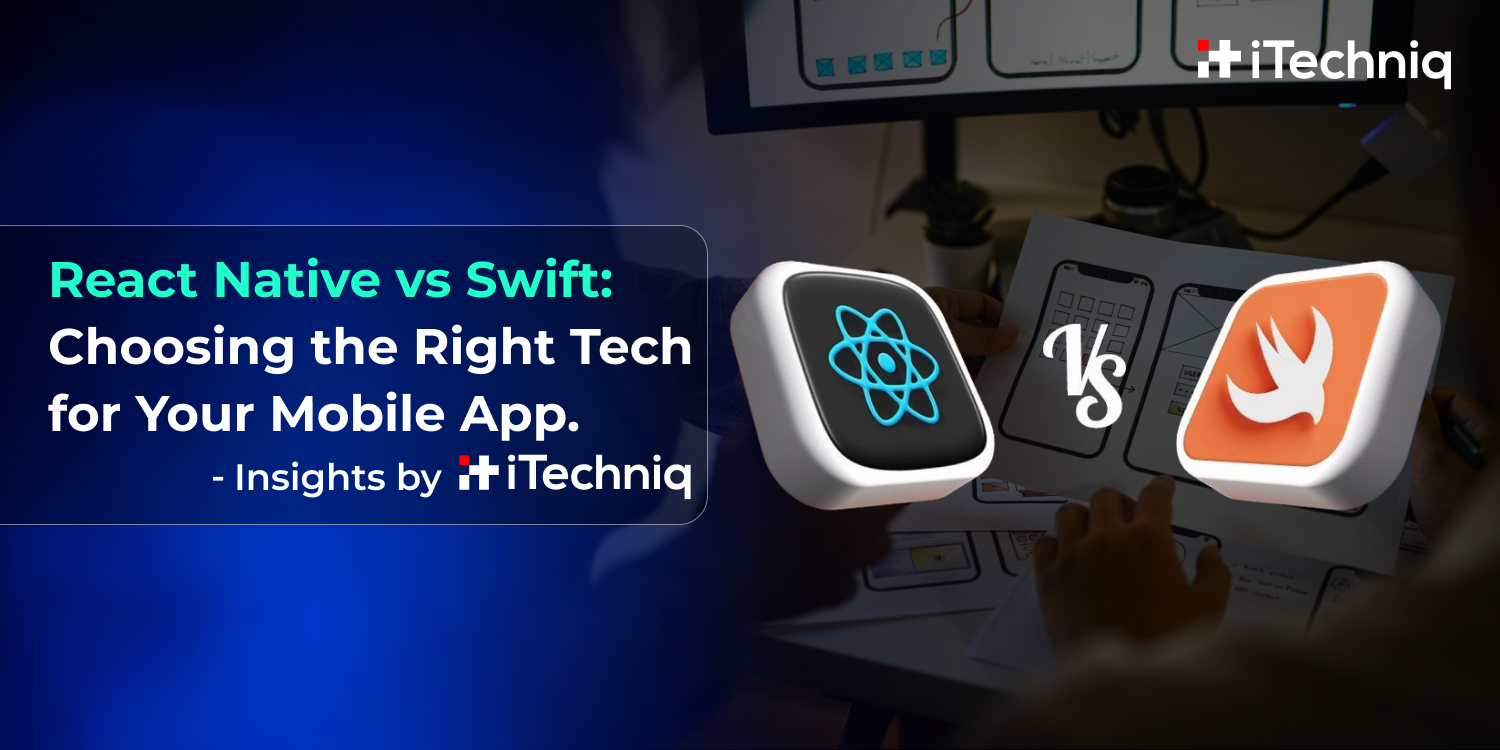
In the constantly changing realm of mobile technology, companies are always plagued with the same question: which technology do they utilize to build their mobile application? With numerous options on hand, selecting the optimal development process is both paramount and perplexing. Among the best choices for companies to consider when making their decision are React Native and Swift — two of the most robust technologies that have strengths, pitfalls, and the optimal applications to which they belong.
At iTechniq, a mature and well-known React Native app development company, we tend to walk our customers through this very same question: “Do I use React Native, or do I create a native iOS app with Swift?” There is no one-size-fits-all answer, but learning the advantages and disadvantages of each technology can guide you in making the right choice for your app, your users, and your future goals.
In this in-depth, human-level guide, we’ll take you through it all — from performance to price, user experience to future-proofing — so that you can make an informed decision, whether you’re a startup founder, enterprise CTO, or entrepreneur with a big vision.
Let’s get started.
Let’s get to know both players on the field before diving into comparisons.
React Native is an open-source mobile application framework created by Meta (formerly Facebook). It enables developers to create mobile apps for both iOS and Android operating systems using a single codebase — developed using JavaScript and React.
This method shortens development time and budget significantly, which is why most companies prefer outsourcing to a React Native app development company such as iTechniq so their apps can reach the market faster.
As a trusted React Native app development company in UK, we’ve helped numerous clients streamline their development processes and reach both mobile platforms simultaneously — all without sacrificing quality.
Swift is Apple’s official language, which is specifically tailored for creating native apps for iPhones, iPads, Macs, and other Apple devices.
In contrast to cross-platform frameworks, Swift offers direct access to Apple’s APIs, enabling developers to create apps that are optimized for speed, performance, and UI fidelity.
We also boast of being one of the leading iOS app development company, assisting clients who wish to have a customized and pixel-perfect iOS experience with Swift.
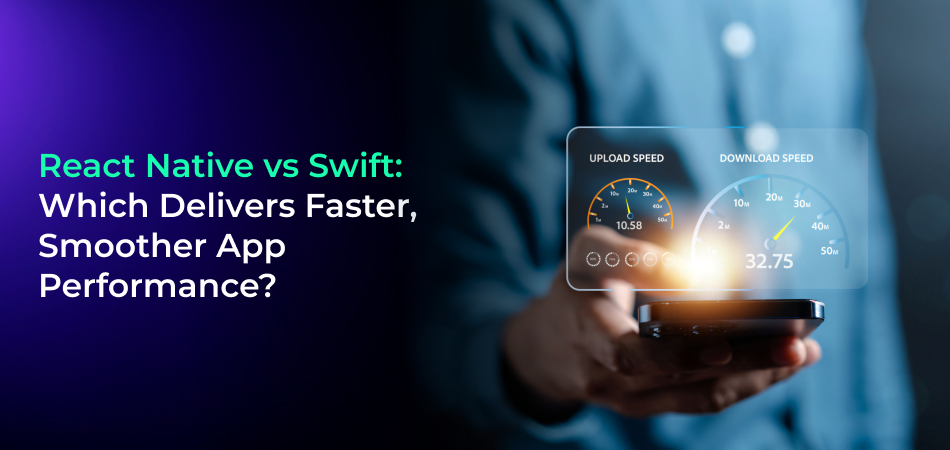
Performance is usually the top priority when selecting a tech stack, and for good reason. Users now demand lightning-fast performance and buttery-smooth interactions. Here’s how the two stack up:
As a trusted React Native app development company in UK, we at iTechniq have developed high-performance apps across various industries such as eCommerce, fintech, education, and healthcare — all developed using React Native.
We know from our own experience as an iOS development firm that when downright top-shelf performance is at stake, Swift holds its own and performs well.
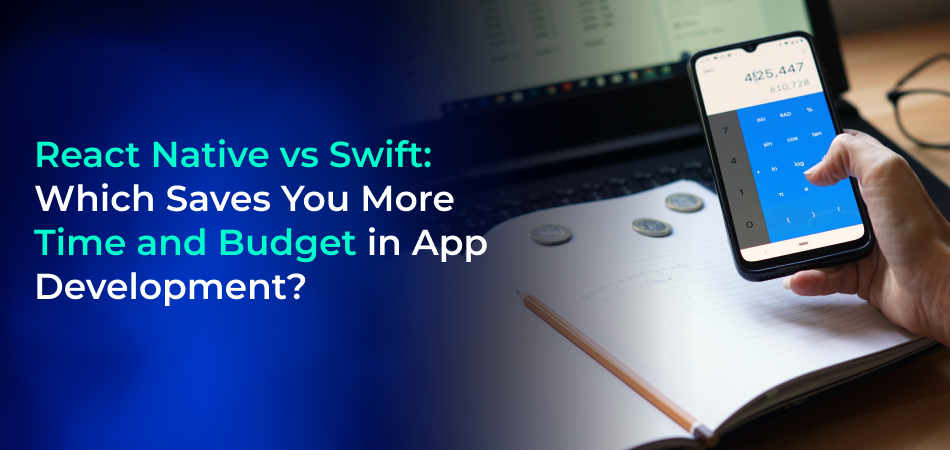
Let’s be real — budget plays a gigantic role in app development. Here’s the cost-effectiveness comparison between React Native and Swift:
As a renowned React Native app development company, iTechniq has assisted various clients in reducing their app development costs without sacrificing quality.
Unless your audience is living mostly in the Apple world, Swift might be worth it. And are you developing for Android as well? We’ve got you covered as an Android app development company as well.
At iTechniq, our developers love React Native for its agility and flexibility, and that’s part of why we’ve become a go-to React Native app development company in UK.
As a full-service iOS app development company, we make sure our Swift developers are continuously upskilling in order to remain ahead of Apple’s frequent updates.

We do whatever it takes to ensure your app doesn’t only function — it feels awesome.
Having created apps as an iOS development agency with award-winning UI/UX — optimized to meet Apple’s perfectionistic demands.

Fortunately, iTechniq is also an Android app development company, and a Flutter app development company as well — so we can assist you in scaling on any platform when you’re ready.
We tend to create custom bridges for what’s involved with biometrics, GPS, and camera access — providing our clients with the best of all worlds.
We take advantage of these features every day in our work as a seasoned iOS app development company.
As a solid React Native app development company, we practice good habits to create modular, scalable apps that are simple to maintain.
We support ongoing maintenance and enhancements for all our clients — whether they’re using Swift or Flutter. (Yes, we’re a strong Flutter app development company too.)
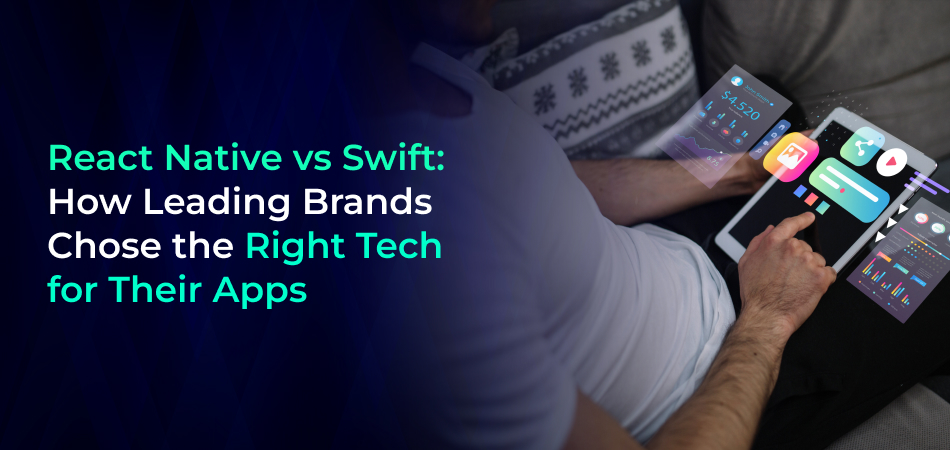
Sometimes deciding the best course of action is by looking at what others have done — in particular, successful firms with comparable problems.
These international success stories motivate numerous clients at iTechniq, a reliable React Native app development company in UK, to adopt the same strategy for quick, low-cost deployment.
As an iOS app development company, we know that sometimes the best option is to go native when user experience takes center stage.
You don’t always need to pick one.
Most companies use a hybrid approach, employing React Native for overall app functionality and Swift for performance-critical modules. This enables quicker development without losing out on advanced iOS features.
We at iTechniq tend to build modular architectures that enable React Native and Swift to coexist — ideal for maturing business models that begin small and grow quickly.
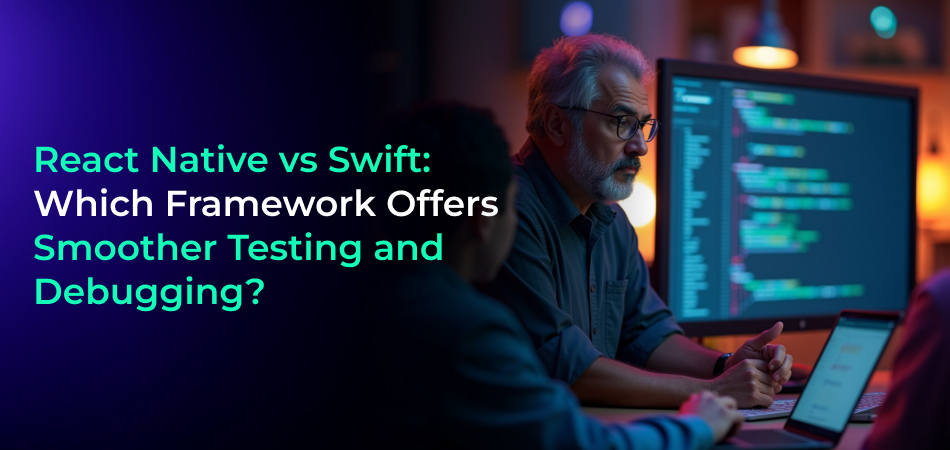
Being a top-rated React Native app development company, we employ solid CI/CD pipelines and test automation to guarantee that every app we release is stable and bug-free.
As a stable iOS app development company, we utilize Apple’s test suite for predictable performance across devices.
iTechniq believes app security is not negotiable — whether we’re your React Native app development company in UK or your Flutter app development company.
React Native isn’t going anywhere. That’s why iTechniq, as a cutting-edge React Native app development company, keeps investing heavily in training, certifications, and R&D.
If you’re fully committed to iOS, Swift will do the job. But where cross-platform flexibility is required, React Native continues to lead the pack.
In mobile app development, pure performance is usually the tipping point — particularly for applications with real-time data, animation, or hardware-based integrations such as AR/VR.
React Native has improved significantly in terms of performance. Although it’s not native Swift-fast, it’s “fast enough” for the majority of business applications — particularly when built by a seasoned React Native app development company.
At iTechniq, we are a cutting-edge React Native app development company in UK, and we apply all these performance tricks as part of our default build process.
Swift has the benefit of being natively compiled, which means that it can execute more quickly and provide more fluid animations. This is particularly valuable in:
As a proficient iOS app development company, we advise Swift when every millisecond of speed matters.
If your mobile app has a global user base, localization and internationalization are a must.
React Native provides libraries such as react-intl, i18n-js, and react-native-localize that make it easy:
This is particularly useful for startups and companies wanting cross-border reach on a shoestring budget — and something iTechniq, an experienced React Native app development company, makes look easy.
Swift provides robust integration with Apple’s built-in localization tools within Xcode:
As a seasoned iOS app development company, we understand how to localize your app to Apple’s best practices and guidelines — making it global App Store ready.

Both Swift and React Native both have support for AI/ML — but implementation pathways are different.
Although React Native natively supports machine learning, it is also able to incorporate:
As a cross-platform mobile app development company in UK, we commonly construct React Native apps that send the AI out to the cloud with the app being lightweight.
Swift is given access to Apple’s machine learning framework Core ML. Swift is capable of:
If you’re designing for iOS and intend to place machine learning deep inside the application, Swift would be your first choice. My company, iTechniq, offers full-fledged iOS application development services. We have used Core ML within fintech apps, health-related applications, as well as within e-learning software with great results.
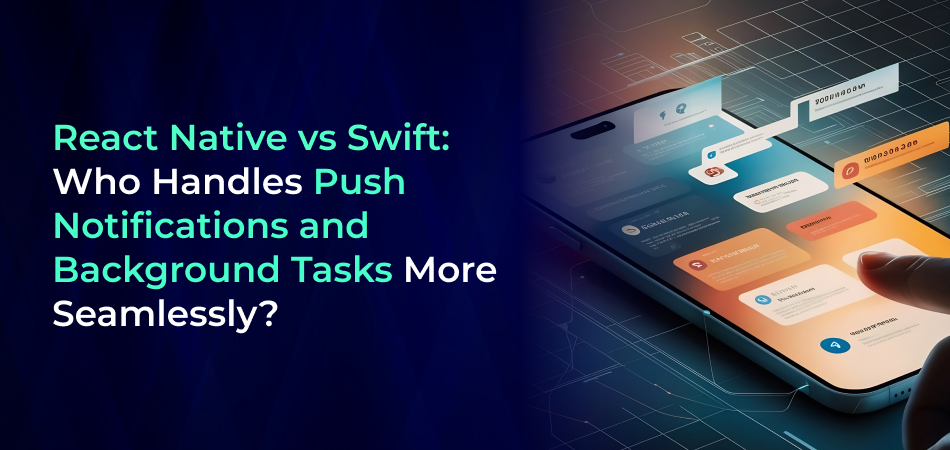
Let’s dive into both platforms’ take on necessary user engagement features such as push notifications and background activities.
React Native does have push notifications through options such as:
You can implement background tasks using react-native-background-fetch, but not as smooth as native ones.
We, being a React Native app development company in UK, understand how to bridge native modules when necessary — so your React Native app doesn’t lose out on real-time interaction.
Swift takes advantage of Apple’s native capabilities such as:
If your app extensively depends on background updates, smart alerts, or iOS-specific connections, Swift provides a stronger and more reliable experience.
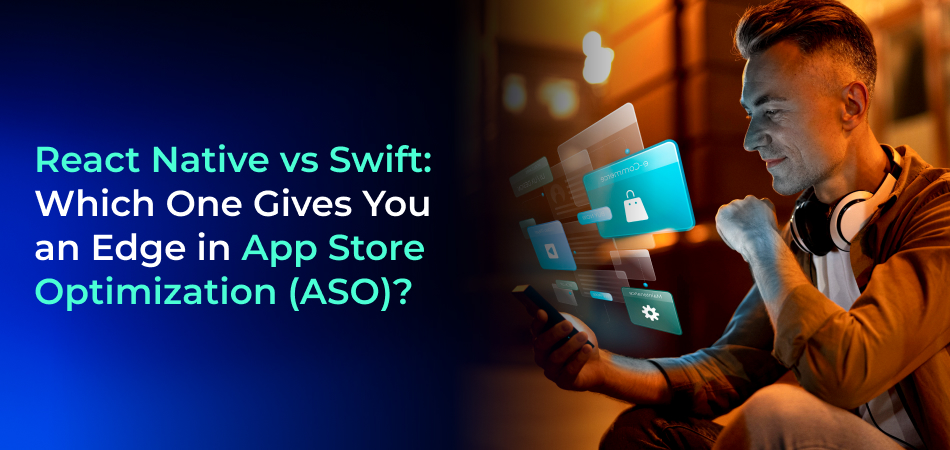
A mobile app’s success also depends on how discoverable it is in app stores.
If you’re using React Native, your app will appear on both Apple’s App Store and Google Play. You’ll need:
That’s why working with a full-cycle React Native mobile app development company in UK like iTechniq means ASO is included in your mobile strategy from day one.
For Swift apps:
Being a careful iOS app development company, we guarantee your Swift application not only gets approved but ranks well in organic search in the App Store.
Let’s break it down for various industries and purposes:
As a trusted React Native app development company in UK, we’ve helped startups, SMEs, and large enterprises deliver products faster — and at scale.
This is where our experience as a specialized iOS app development company really shines — ensuring quality, security, and iOS design compliance.
You might also be wondering how Flutter comes into this.
Flutter is built on Dart and provides UI uniformity across platforms with its own rendering engine. It’s a good alternative if:
iTechniq is also a professional Flutter app development company, providing clients with an additional potent avenue for creating cross-platform mobile apps.
If your main market is Android-first, then employing Kotlin or Java may be a good idea — particularly for:
We also provide bespoke solutions as a powerful Android app development company, giving native performance and full Android OS control.
There is no one-size-fits-all solution to whether Swift or React Native is superior. The decision must be based on your:
At iTechniq, we don’t merely develop apps — we design digital experiences that meet your business objectives. If you require a React Native app development company, a Flutter app development company, or an Android app development company, we’ve got everything you need.
No matter your tech stack, iTechniq is your go-to mobile app development company in UK — ready to turn your app idea into a reality.
Let’s build something amazing together.